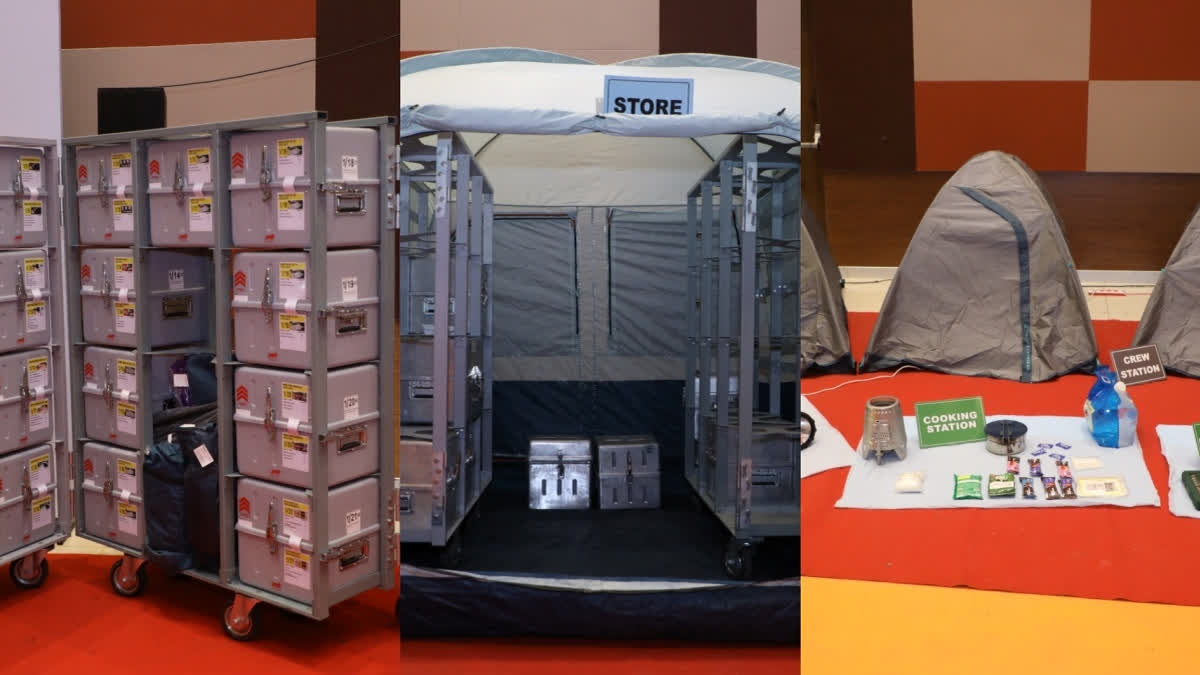New Delhi: To provide immediate medical help during natural disasters or humanitarian crises not only in India, but also abroad, India has developed Project BHISHM-Bharat Health Initiative for Sahyog, Hita and Maitri, a mobile cube-hospital tailored to treat up to 200 patients, emphasising rapid response and comprehensive care.
Project BHISHM was recently launched in the country under the Aarogya Maitri Project. A senior health ministry official told ETV Bharat that the initiative launched under the leadership of Prime Minister Narendra Modi and jointly developed by the Ministry of Health, Ministry of Defence and the National Security Council represents a transformative leap in India’s humanitarian efforts and emergency response capabilities.
Under this project, India has pledged to provide essential medical supplies to any developing country affected by natural disasters or humanitarian crises. This commitment extends beyond immediate aid it includes establishing a Global-South Centre of Excellence for research on scalable development solutions.
“Following the successful vaccine maitri initiative during the Covid pandemic, the 'Aarogya Maitri' project is a continuum of India's growing role as a global healthcare leader.” The official said. A flagship component of this project is the innovative Aarogya Maitri Aid Cube, a modular trauma management and aid system designed for rapid deployment whether in times of peace or war. This cube, a part of the broader initiative named Project BHISHM-Bharat Health Initiative for Sahyog, Hita and Maitri, is tailored to treat up to 200 people, emphasising rapid response and comprehensive care.
In the face of mass casualty incidents (MCIs) where requirements range from basic aid to advanced medical and surgical care, the Aid Cube stands out with its ability to be deployed within an astonishing 12 minutes. This swift deployment capability is crucial, as it effectively bridges the crucial time gap from primary care to definitive care, potentially saving numerous lives in the golden hour of emergencies.
The Aid Cube is a paragon of efficiency and versatility. It consists of two sets of master cube cages, each containing 36 mini cubes organised into various functional units. These cubes are robust, waterproof and light, designed for various configurations, making them ideal for diverse emergency scenarios. From airdrops to ground transportation, the cube can be rapidly deployed anywhere, ensuring immediate response capability.
Each mini-cube within the master cage is meticulously packed, prioritising ease of use even by trained responders. This approach acknowledges the reality that many on-site individuals during MCIs may lack medical training. The packing strategy focuses on the function of items rather than their names, with smart packaging, including photographs for easy identification.
The official said that advanced medical equipment, RFID-tagged for efficient repacking and redeployment, is a key feature of the Aid Cube. The state-of-the-art BHISHM software system integrated into a provided tablet allows operators to locate items quickly, monitor their usage and expiry, and ensure readiness for subsequent deployments. This software system, akin to a global/national level master dashboard, facilitates real-time data analysis for proactive response planning.
“Cost-effectiveness is a cornerstone of the Aid Cube's design. The durability of the master cube cage and mini cubes allows for multiple deployments, reducing waste and ensuring the right supplies are delivered for specific scenarios. This sustainable approach is emblematic of the project's long-term vision,” the official said.
The versatility of the Aarogya Maitri Aid Cube is further highlighted by its adaptability to various scenarios from earthquake relief and combat zone support to augmenting urban medical facilities or responding to industrial accidents. Its comprehensive design makes it a one-stop solution for all scenarios, embodying the spirit of the "Aarogya Maitri Project" in providing holistic, efficient, and life-saving aid. The project has been showcased to various national and international dignitaries, garnering positive feedback, most recently at the G20 Summit. These demonstrations have been pivotal in illustrating the project's capabilities and potential on a global stage.
